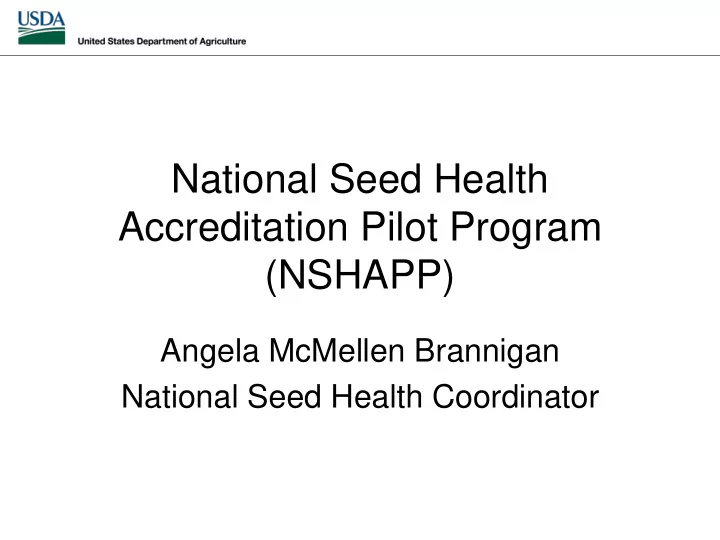

National Seed Health Accreditation Pilot Program (NSHAPP) Angela McMellen Brannigan National Seed Health Coordinator
Brief overview of Live Meeting Kathryn Bronsky Assistant Program Manager
• Challenges to APHIS of Seed Trade • What is NSHAPP? • Why is APHIS interested in CGMMV? • Roles and Responsibilities • Enrollment • Positive Find Reporting • Benefits to APHIS and Industry • Questions?
Challenges of Seed Trade • Historically seed moved without many phytosanitary barriers • Seed moves in complex global patterns
Traditional Trade Model A B
Seed Trade Model 3 5 1 2 6 4 7 1.Breeding parental lines: Europe State 1 2.Production of basic seeds: Europe State 2 3. Treatment and manufacture of basic seeds: Europe state 1 4. Production of hybrid seeds: China 5. Treatment and manufacture of commercial seeds: Europe state 1 6. Commercial packaging: USA 7. Final market: Mexico *Adapted from a presentation by Ric Dunkle, PPQ Seed Summit, 2014
Challenges of Seed Trade • Many pathogens are transmitted by seed • Majority of pathogens cannot be found through visual inspection • Countries moving towards more import testing requirements • Import testing requires infrastructure and resources at port of entry
What is NSHAPP? • National Seed Health Accreditation Pilot Program (NSHAPP) • Alternative to Rulemaking approach to mitigating risk of incoming seed • Funded by Farm Bill for FYs 15 & 16 • Iowa State partner with APHIS
What is NSHAPP? • Voluntary program for companies to test imported seed • Model for pilot project: Cucurbit Seeds and Cucumber Green Mottle Mosaic Virus (CGMMV) Source: Biosecurity Australia
Why is APHIS interested in CGMMV? • Highly stable virus that persists in the environment • Easily transmitted • Results in high yield Source Biosecurity Australia loss or unmarketable product • Found in area of high agricultural yield
Roles and Responsibilities-APHIS • Regulatory oversight • Procedure and policy development • Steering committee • Operational oversight
Roles and Responsibilities-APHIS • Enroll companies in NSHAPP • Coordinate with State Dept. of Agriculture • POC for questions and concerns • Site visits and/or perform audits, if needed • Operational guidance • Address non-NSHAPP issues as needed • Coordinate re-export or destruction of positive lots • Refer issues that may arise to other government agencies
Roles and Responsibilities-Industry • Test all incoming cucurbit seed using the approved ELISA method • Cb 3.1 ISTA Assay 7-026 Source: seedsavers.org
Roles and Responsibilities-Industry • Report all tests once per month using form designed by ISU • Report all positive finds immediately to National Seed Health Coordinator • Assist APHIS is building robust non- regulatory framework for limiting introduction of seed transmitted pathogens
Roles and Responsibilities-ISU • Methods development • Testing seed for participants without an accredited lab • Random confirmatory testing • Data management
Enrollment Process • Interested companies contact National Seed Health Coordinator • Companies provide proof of accreditation, list of facilities, contact person(s), disposal protocol
Enrollment Process • Local PPQ/State Department of Agriculture meet with company to sign compliance agreement • Iowa State adds company name to website
What happens when a lot is positive for CGMMV? • Company contacts National Seed Health Coordinator at APHIS immediately and provides required information
Positive Find Required Information • Crop species and variety • Unique seed lot identification number • Seed origin • Year produced • Testing location, date • Current location of impacted seed lot and safeguarding measures • Volume of positive seed lot • Customs entry number and a copy of the foreign phytosanitary certificate
Positive Find • Local PPQ/State Department of Agriculture meet with company to give them the option to re-export or destroy seed
Positive Find: Destruction Methods • T415-a - Garbage: Incinerate to ash • T415-b – Dry heat: 2120F for 30 minutes followed by burial in a landfill • T408-a – Dry heat: various time/temperature combinations above 230oF • T408-b – Steam: 250oF@15 pounds per square inch for 30 minutes • Deep burial
Positive Find • Local PPQ/State Department of Agriculture can assist with and may choose to witness the destruction of the impacted seed lot(s) • All positive lot information is kept confidential by APHIS
Benefits to APHIS and Industry • APHIS avoids restricting trade • APHIS has the opportunity to test a novel approach to limiting risk of imported seed • APHIS and industry work collaboratively on mitigating seed import risk • Industry avoids a more cumbersome regulatory solution • Industry can use participation in marketing
More Information? • http://www.seedhealth.org/imported-seed- pilot-program-nshapp
More Information? • Contact Angela McMellen Brannigan National Seed Health Coordinator 301-851-2314 Angela.McMellen-Brannigan@aphis.usda.gov
Questions?
Recommend
More recommend